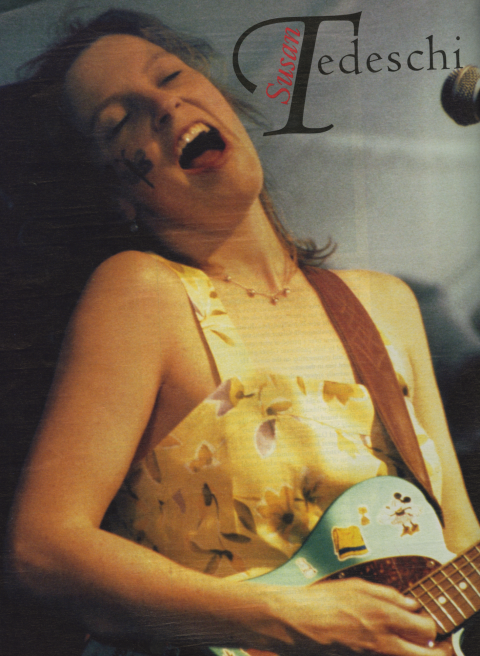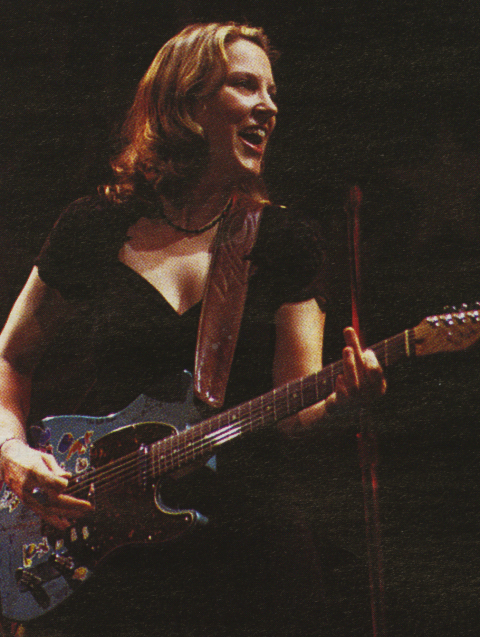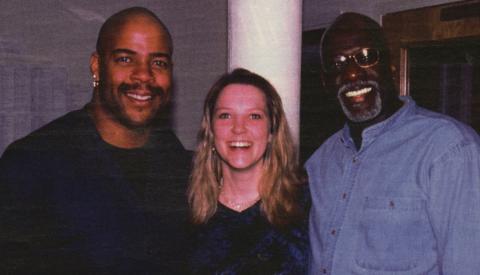Blues Star on the Rise

Though some music journalists have compared her to Bonnie Raitt or Janis Joplin, Tedeschi is no knock-off. While she freely admits to loving the contributions of Joplin and Raitt, Tedeschi has drunk from the source and has sunk her roots deeply into blues and gospel soil. She speaks in detail about the music and lives of the blues masters and keeps a large stash of their CDs on her tour bus.
Since her Just Won't Burn CD came out in 1998, the road has been her home. It was only very recently that she established a permanent address. Together with her band, she has traversed the continent many times, playing nearly 900 dates. Along the way, Tedeschi appeared at the 1999 VH-1 Concert of the Century and Farm Aid events as part of an all-star cast. She has continually been in good company, sharing the stage with the likes of Bob Dylan, the Allman Brothers Band, John Mellencamp, Ray Charles, Sarah McLaughlin, Willie Nelson, Neil Young, the Dixie Chicks, and many others. Beginning in August, she was a featured member of the B.B. King Blues Festival 2000 tour traveling with King and Buddy Guy throughout the Northwest, the deep South, and the Midwest before the tour wound down October 2.
Tedeschi found her musical path after sitting in regularly at blues clubs throughout the Boston area following her graduation from Berklee in 1991. She assembled her own band in 1993 and began working all over New England. After winning Boston's Battle of the Blues Bands the following year and placing second at a national blues contest in Memphis in 1995, she self-produced her debut album, Better Days. She later signed with Tone-Cool Records and released Just Won't Burn to great critical acclaim. Embraced by radio and the music press alike, the disc has lifted Tedeschi's career to new heights and was recently certified gold after selling more than half a million copies.
In addition to getting good press, she has been receiving awards like a Grammy nomination as Best New Artist, seven Boston Music Awards, and three W.C. Handy Awards. She has made her way into other media by appearing on TV shows hosted by David Letterman, Conan O'Brien, and Donnie and Marie Osmond. Tedeschi's music has also turned up in the soundtracks of The Flintstones in Viva Rock Vegas and Autumn Heat, and has been used in the TV sitcom "Party of Five" and other shows.
It is a rarity when a blues artist captures the attention of such a large audience. Like most committed blues performers, Tedeschi did not startdown this path with visions of extensive MTV coverage and arenas full of fans chanting her name. In fact, she prefers small venues and takes pleasure in having earned a Grammy nomination without a video. Some things are likely to change as her career continues to unfold. What will not change, however, is Tedeschi's dedication to musical integrity and her strong work ethic. All of those are hallmarks of an artist destined for career longevity.
When did your interest in music begin?
It seems like I have always sung. My mom says I could sing before I could talk. Inspiration to play music came from seeing my father sit around the house playing acoustic guitar and harmonica. My mother used to sing, and my aunt Josephine had a career as an opera singer. She had sung at La Scala in Italy in the 1940s and 1950s and she taught me how to breathe correctly when I was young.
I have memories of just getting up in front of the family or getting onto the stage for a show. It was just a matter of time until I got involved with some other kids from my area who had a band. Starting at 13, I was playing cover tunes, rock and roll, Beatles tunes, or whatever the others knew how to play. I came to Berklee when I was 17.
What drew you to Berklee?
For a high school graduation present, I was given tuition to attend Berklee in the summer. I wanted to do it for college credit, though, not just for the five-week program. I was always a nerd and loved school. I worked hard at it and got a lot back from it. At that point, I didn't know if I wanted to become a marine biologist or a musician. So I tried Berklee for the summer. I was supposed to go to college in Ithaca, New York, but I bagged that a few weeks before the end of summer and stayed on at Berklee. That was in 1988. My parents were very supportive of my decision to go into music. I was really lucky that they felt that way.
Were there any teachers at Berklee who were particularly important to your musical development?
Dennis Montgomery and Orville Wright are still important to me. They are great musicians; each of them has perfect pitch. They both can sing and play the hell out of a piano. Dennis can get other people to sing well, too. You have to be pretty good if you're going to tell Donny Hathaway's girls how to sing as he did when they were Berklee students.
Walter Beasley, Richard Evans, Rob Rose, and Ken Zambello, and everyone who was involved with the Performance Division at that time, were great. If I could go back, I'd take more classes with Jerry Cecco and Greg Badolato. My conducting teacher, George Monseur, was also amazing. He had gone to the Paris Conservatory and had studied under Toscanini. He had us conducting Stravinsky's Rite of Spring and Italian operas. I really learned about a lot of different styles there.
I have seen video footage of some of your performances at Berklee and saw a metamorphosis over the course of the years you were here. An early clip shows you singing with a very clean vocal sound. Later footage shows the grittier approach that you are known for now. How did your style evolve?
I think it was singing in the gospel choir that did it. In the early days, I was listening to a lot of Linda Ronstadt and musical theater. I like singing in a pretty style, but I wanted to find something with a little more guts, a little more soul. I loved the gospel choir. I had never been shy about singing in front of people, but singing in front of a whole bunch of people who could really sing was a little frightening. I was only 19. I didn't even play guitar back then. I started that about six years ago. I used to have a lead guitarist in my band, and when he left, Buddy Guy said to me, "You don't need to hire anybody to play guitar for you." He was very encouraging to me.
Wow, you've only been playing six years? I can hear that your style is rooted in the playing of the blues masters.
That is the only style I can really play. I could also play folk stuff and do other things if I worked them out, but I naturally lean toward the blues. I love the playing of Johnny Guitar Watson, Buddy Guy, B.B. King, Albert Collins, and others. I have also listened a lot to John Lee Hooker, Jimmy Rodgers, and Robert Jr. Lockwood. Did you know that before Dr. John was a piano player he was a great guitar player? He only went to the piano because he had been shot so many times that he couldn't move his fingers the same way anymore.
You are very knowledgeable about the music and lives of the blues legends. I understand that you have gotten to know many blues and rock artists through the festivals you have played.

When did you decide to carve out your musical identity in the blues?
I think it was after singing in the gospel choir that I made the decision. I knew that as a young white girl, I couldn't make a living singing gospel. I'm not Mahalia Jackson. It seemed that it would be easier to make a living singing blues rather than gospel.
How did you end up signing with Tone Cool Records?
I had been offered other deals, but nothing seemed really good. I was looking for a company that would be honest, one that I could trust. I wanted a company that was appreciative of the roots music that I like. Tone Cool's president, Richard Rosenblatt, is a great guy and a good harmonica player. He used to play in a group called the Eleventh Hour Blues Band and is really supportive of all the artists on his label. At the time when I was signing, these were the main things that I wanted. I found them with Tone Cool.
I have been offered major label deals since then, but I haven't been tempted by offers of money and things that a lot of artists would die for. It doesn't seem right to me. Those labels seem like a big bank trying to give me a loan. They would want to try to project my image a certain way and try to shape me and what I do. I already know what I want to do. I am not in this business to do videos, create a lot of hype, and be a rock and roll star. I just love to play and sing. I just want to do what I am doing. I don't need to go to a huge level and play arenas. Actually, I played some arenas opening for John Mellencamp, and those places don't sound very good.
I also think about having a family someday. That has been on my mind for my whole life. I am coming up on 30, and it makes me think that I don't have a whole lot of time for having a family. I figure I have a good 10 years. I would rather have a family while I am young. I know a lot of musicians who do have kids and still find a way to go on the road.
On your records, the original songs are blues-rock based, but in your live show, you play a lot of material that is straight out of the blues repertoire. Do you see yourself pursuing the path of a blues artist, or are you more likely to stake your claim as a cross-over artist?

Tedeschi: "Dennis Montgomery and Orville Wright are still important to me." Tedeschi visited with her former instructors Montgomery (left) and Wright while at Berklee to review live concert footage shot in her student days for a VH-1 special on her career.
I am already considered a cross-over artist. A lot of the tunes that I write aren't blues. With this band, we tend to play the blues more because we haven't had a huge amount of time to rehearse the original tunes. Those take time to work out. I have been on the road for three years straight.
When I do get time off, it is time to make a record. When there is a little break, I go and visit my boyfriend Derek Trucks, who is usually on the road somewhere too. He plays slide guitar with the Allman Brothers and leads the Derek Trucks Band. I played in Brooklyn last night, and he came out and played with us. After the show, we went to see Elvin Jones and Cecil Taylor playing together at the Blue Note. I didn't get in until 4:00 a.m.
What could you tell young women coming up through the ranks in the music business?
For someone just starting out, going on the road and seeing places you've never been to before can be really fun. Sometimes the hotels can be really nasty because you can't afford the good ones, so safety can be an issue. Driving 700 miles a day in a van with five guys, you have to be prepared to be "one of the boys." Unless you have an all-girl band and the van smells great, you might have some things to get used to. These days, for me, things have gotten better. We have a tour bus, and we can travel at night after the gigs. That gives us more time.
Being a woman in the business, there are things that work for you and things that work against you. It's just like being a girl on the playground. If you want to play baseball with the boys, you have to prove yourself. You are not going to get picked for the team if you can't catch or throw. You have to be some kind of an asset. It is the same in the music industry. Women are mostly known for being singers. That's why I wanted to learn to play guitar. I didn't want to just be the singer. The players won't take you seriously as a musician unless you can hang with them instrumentally. I have found it really helpful to play an instrument.

Tedeschi jamming onstage with legendary blues icon Buddy Guy. "He was very encouraging to me," she said.CHUCK WINANS
What radio formats do you fit, and what cuts are stations likely to program?
Most stations will play "Rock Me Right," "It Hurt So Bad," or "Just Won't Burn." The formats are usually Triple A [album, adult, alternative] or rock. I also get played on blues shows on National Public Radio. There is still a lot of bribery that goes on in radio. People think that payola is dead, but it's not. It is everywhere, in every city. I feel bad for the guys at my record company. They will call and say, "Can you do this interview? I know it's hard because you are driving and your cell phone isn't working. If you can't do it, we'll just give them a guitar." I get mad thinking about that because there are so many people who play guitar but don't own a good one. But if the label doesn't do something for them, the stations won't play the record. There is so much politics in the music industry.
Do you have any ideas about the direction of your writing for the next album?
I will just write whatever comes out. If I do some covers, they might be old r&b tunes by people like Al Green, Marvin Gaye, or Otis Redding. I'd like to have a horn section and get a sound like Bobby Blue Bland's.
Does your label nudge you to come up with songs that are going to work for radio?
Sometimes they do, and I will give them something to make it easier for them. An artist can decide to do certain songs for radio or do other songs because it will make a good record. Making a good record is better than trying to get radio play. I find that if I like it, the people will like it. If I don't like it, the people probably won't like it either. Mostly, I just want to make a great record, and if that isn't enough, fine. I'll just be poor.




